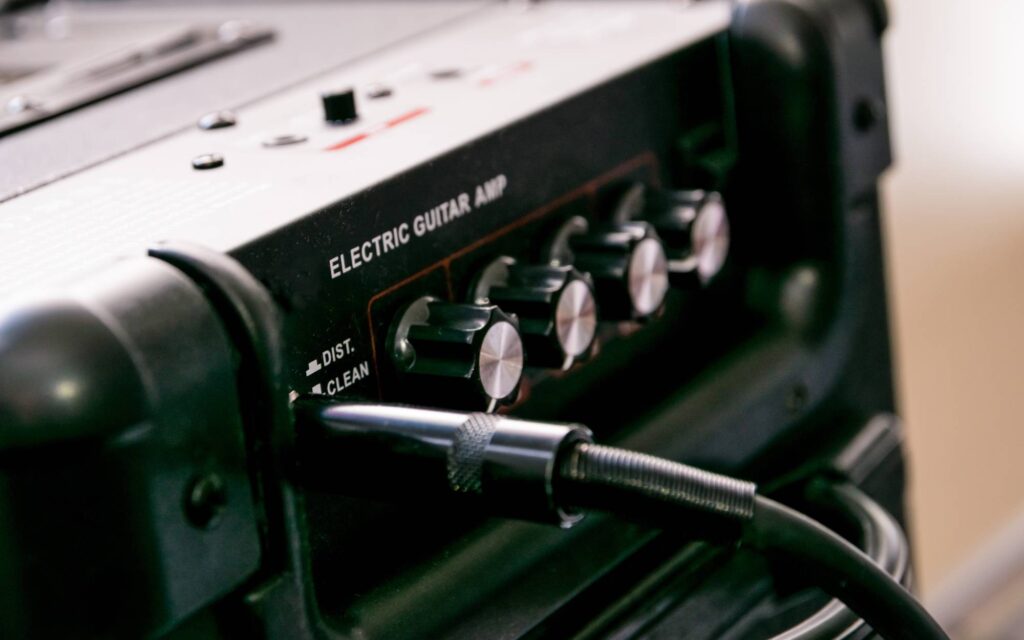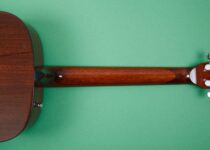Can you use an acoustic guitar with an electric amp? Short answer: Yes, you can use an acoustic guitar with an electric amp, especially if you’re in a pinch. The setup won’t damage your guitar or the amp, but you won’t get that rich, pure acoustic tone that you want. An acoustic amp is better suited for this purpose.
Let’s face it. You understand how expensive a good amp can be if you’re a guitarist. The issues build up when you’re playing more than one type of guitar. An acoustic amp for an acoustic, an electric amp for your electric, a bass amp for your bass – all these costs pile up very fast.
It’s only sensible for you to want to save some money, so you may have wondered, “Can I use my acoustic guitar with an electric amp?” But beware, because there are several issues you can run into if you’re not careful. Read on to find out more, and you may save yourself from a surprising shock!
Post Contents
Do People Actually Use An Acoustic Guitar With An Electric Amp?

It’s not uncommon for guitarists to use an acoustic guitar with an electric amp if that is the sound they are going for. An electric amp tends to add crunchiness and a bit of gain to the sound, which is suitable for an electric guitar, but not so much for acoustic.
The electric amp won’t give you the natural acoustic tone of your guitar, and if that is what your music needs, you might want to invest in an acoustic amp.
If you have a simple acoustic guitar without a pickup or any jack, you certainly won’t be able to plug it into any amp. In that case, a cardioid microphone (either dynamic or condenser, depending upon where you’re playing) positioned in front of the soundhole will do the job well.
You can plug the microphone into the venue’s input if you’re playing at a live gig, or you can record directly into your computer with a USB microphone. You can connect your computer to your speaker of choice to get a good output.
If you have an acoustic-electric with a built in pickup, you should invest in an acoustic amp. Chances are that you won’t want a compressed and distorted tone every time you play, which is where the acoustic amp comes to your aid.
But in case you’re thinking of doing this, here’s a video that demonstrates an acoustic guitar plugged into an electric amp, along with electric guitar effects as well:
How Are Acoustic Amplifiers Different From Electric Amplifiers?
Both acoustic amps and electric amps amplify sound. But how are they different?
Electric guitars and acoustic guitars are meant to produce different sounds, so their amplifiers have to work in different ways. Electric guitars produce a more distorted and compressed sound, and they often require more gain in the audio. Electric amps do both and have ports to add pedals (FX loops) and several knobs and EQ to create the sound you want.
Acoustic guitars owe much of their rich and mellow sound to the tonewoods that make up the guitar’s body. An acoustic amp won’t try to modify the sound coming from the instrument – it will only amplify the volume. This is why acoustic amps have woofers and tweeters to amplify both high and low frequencies. They work a lot like the speakers in your home theater system, but without the added bass.
Acoustic amps also have inputs for a microphone or your phone, which may help you during a gig where you’re singing along. An electric amp won’t have these functions, and you will need to plug your microphone into a different output that’s designed for mics.
Acoustic Pickups And Preamps – How They Influence The Sound
Yes, you read that right. The sound your guitar makes when plugged into an amp depends on the kind of acoustic guitar pickup your instrument has. Based on that, you might consider having an electric amp or an acoustic amp to achieve the tone you want.
Most factory models have an active pickup. These pickups are powered by batteries. These make the sound more consistent, and if you’re someone who has to plug their guitar into different amps, the active pickup makes sure that your guitar doesn’t sound too different on any amp. Fishman’s preamps are renowned as some of the best in the world.
If your guitar has a passive pickup, the tone and the sound of your guitar can vary greatly depending upon the impedance of the amp you’re plugging your guitar into. An external preamp can provide a consistent interface and ward off problems.
In either case, if you’re going for the electric sound that a lot of people like, or if you simply want to modify your acoustic’s tone with pedals, an electric amp could be a good option. But in tracks that do not require that sound, an electric amp could sound jarring and discordant.
For instance, if you’re playing a track that requires the depth of sound that your acoustic can produce at low frequencies, you might not want an electric amp. Electric amps are created to highlight midrange and treble frequencies.
An electric amp, in this case, will make your instrument’s lower frequencies sound distorted and muddy. In worst-case scenarios, the amp won’t even pick up on the frequencies, defeating the purpose of plugging your guitar into the amp.
So if you’re an acoustic guitarist, you might want to keep an acoustic amp at hand. They can help you replicate the sound of an unplugged acoustic guitar without any changes to the tone, especially in loud environments.
Will I Damage The Guitar Or The Amp?
No, you will not.
Although we recommend against plugging your acoustic into an electric amp, we do this based on your instrument’s authentic sound and not based on potential damage.
Your guitar is functioning as the input audio to the amp, and your amp won’t make your guitar process any output. The amp being unable to replicate the exact tone of your guitar is the only “damage” that your guitar might face.
But we definitely don’t recommend cranking up the gain on your amplifier with your acoustic plugged in. The feedback noise can quickly get out of hand, and may even electrify the strings, giving you a slight shock!
So, Can You Use an Acoustic Guitar with an Electric Amp?
If you have an acoustic guitar with a good pickup and do not exclusively play at venues with their own inbuilt output, then yes, you do need an acoustic amplifier.
If you’re planning to practice at louder volumes at home, then yes, an acoustic amplifier is ideal for that too.
Acoustic amplifiers do the job of merely making your instrument louder without modifying its tone in any way. If you have a higher-end acoustic guitar and want to replicate its exact sound, you will want to invest in a good acoustic amp, like this one:
The acoustic amp is also a blessing for singers who want to play along since they have microphone and mobile phone inputs.
Many musicians at gigs play the backing track from their phone into the amp as they sing. This ensures a cleaner, more homogeneous sound without the technical hassle of setting up a separate output for every component of the song.
If your guitar doesn’t have a pickup, then you will have to mike it up properly to capture the nuances of its sound. We recommend a cardioid condenser microphone.
These microphones pick up sound along one axis (cardioid) and are sensitive to both lower and higher frequencies (condenser). Set up the microphone near the soundhole so that your instrument is slightly off its axis to reduce feedback gain.
If you need to listen to the room’s acoustics or echoes – such as in classical guitar or experimental styles – you should consider an omnidirectional condenser instead of a cardioid. Omnidirectional microphones pick up sounds along all axes and pick up surrounding sounds and echoes.
On the other hand, if you’re willing to risk a slight electric shock and are looking for some experimental acoustic-electric sounds, then an electric amp is a good way to explore new sonic possibilities.
Frequently Asked Questions
Can I make my acoustic guitar sound like an electric?

No, you won’t be able to make your acoustic guitar sound like an electric. Not entirely, at least. But you can create many tones associated with an electric guitar by plugging your acoustic into an electric amp.
An electric amp is built to distort the sound of the input instrument, and you can easily change the EQ and gain on the amp to achieve the sound that you might want. Sure, you might not be able to replicate Bon Jovi’s Livin’ On A Prayer, but you can get quite close to that crunchy sound, and you may even stumble onto something new.
Why do I need an acoustic amp?
You need an acoustic amp if you’re looking to amplify the volume of your acoustic guitar while retaining its authentic tone. If you’re caught in a situation where your acoustic needs to be louder without compromising the instrument’s tone, you’ll definitely want an acoustic amp. An electric amp may make your instrument louder, but it can significantly alter your guitar’s sound, and it may lose its richness.







